- Table of Contents
- 1. Introduction
- 2. West Virginia Motorcycle Insurance
- 3. West Virginia Motorcycle Helmet Laws
- 4. West Virginia Motorcycle License Laws
- 4.1 West Virginia Motorcycle Instruction Permit
- 4.2 West Virginia Class F License or Endorsement
- 4.3 West Virginia Motorcycle License Test
- 5. West Virginia Motorcycle Passenger Laws
- 6. West Virginia Lane Splitting Laws
- 7. West Virginia Motorcycle Equipment Requirements
- 8. Sources
1. Introduction
Riding a motorcycle can be an exhilarating experience, especially if you are spending time admiring the beautiful scenery and navigating the paved roads of West Virginia. It can also be equally terrifying if you do not have a complete understanding of your motorcycle nor the rules of the road for this state. Learning how to operate a motorcycle includes more than just practicing on the street or passing a driver’s test. You also need to have an understanding of the laws regarding motorcycle insurance, helmets, passengers, lane spitting, and equipment.
This infographic will provide an overview of the essential motorcycle laws and a step-by-step explanation of the licensing process in the state of West Virginia.
2. West Virginia Motorcycle Insurance

If you wish to travel through West Virginia, you are required by law to carry proof of West Virginia motorcycle insurance and registration of your vehicle. In the event you are involved in an accident, having West Virginia motorcycle insurance will help pay compensation to affected parties for any damages or medical expenses accrued. Keep in mind that local law enforcement will ask you to show documentation during any traffic stop or vehicle crash investigation.
Your West Virginia liability insurance coverage must be able to cover the minimum costs for the following accident-related fees:
- $25,000 for bodily injury to a person per accident
- $50,000 for bodily injuries to multiple people per accident
- $20,000 for property damages sustained per accident
If you wish to protect your health and property, you will need to acquire optional forms of motorcycle insurance coverage. As these are not mandatory, only purchase what you can afford and what will be useful under specific circumstance during an accident:
- Uninsured coverage
- Underinsured coverage
- Collision coverage
- Comprehensive coverage
3. West Virginia Motorcycle Helmet Laws


As West Virginia has a universal motorcycle helmet policy, all motorcyclists regardless of age are required to wear protective headgear when they are operating their vehicles in this state.
Despite it being the law that motorcyclists in West Virginia be wearing protective headgear at all times, statistics in recent years have shown there have been fatalities due to riders being reckless or careless.
- In 2019, the National Highway Traffic Safety Administration stated that motorcyclists were 29 times more likely to die in an accident than passenger vehicle occupants
- Over the course of five years, the Governor’s Highway Safety Program reported that there were 154 motorcycle fatalities and about 50 of them were not wearing motorcycle helmets
- In 2019, states that enforce a universal motorcycle helmet policy like West Virginia reported only 9% of motorcycle fatalities on average were not wearing motorcycle helmets
- According to the Insurance Institute of Highway Safety, motorcycle helmets can help reduce the risk of fatal head injuries by 37% and the risk of serious head injuries by 67%
An approved motorcycle helmet accepted in Virginia must have been made with quality materials by the Snell Memorial Foundation or the American National Standards Institute. It must also comply with the safety parameters set by the U.S. Department of Transportation.
The two models that meet the criteria stated above while providing protection and visibility are three-quarter and full-face helmets.
Listed in this table below are the features that your motorcycle helmet is required to have if you wish to operate a motorcycle in West Virginia:
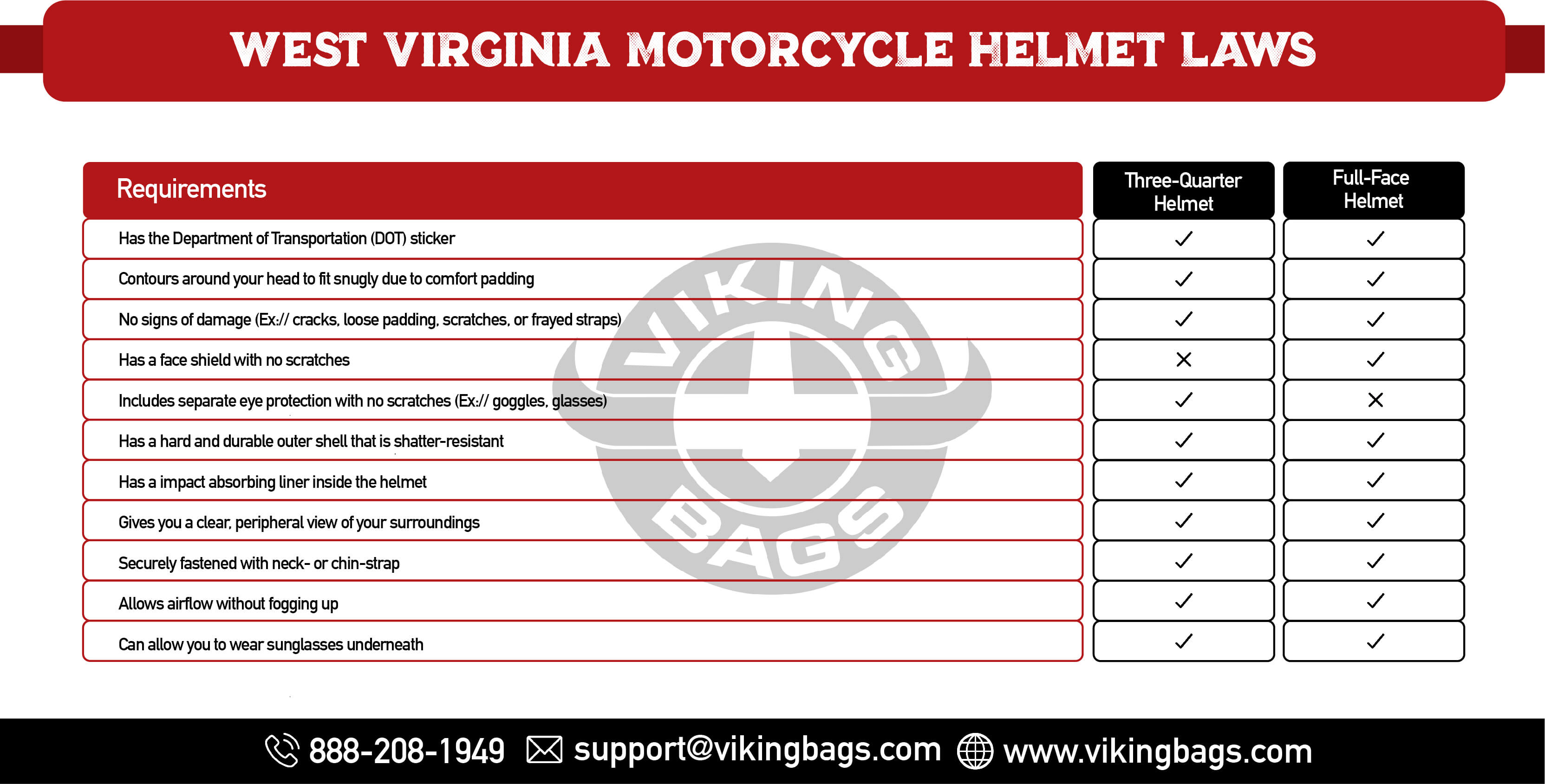
4. West Virginia Motorcycle License Laws

4.1 West Virginia Motorcycle Instruction Permit
You can begin applying for a West Virginia motorcycle instruction permit if you are at least 16 years old or above.
You will have to pay a fee of $5 to be issued a West Virginia motorcycle instruction permit that is valid for 90 days. You cannot renew this type of permit and will have to retest to get a new one should it expire.
To be given the permit, you must complete the following tasks and fulfill all of the listed criteria:
- If you are under 18 years old:
○Complete a Level II Graduated Driver’s Licensing Program
- Present identification documents
- Provide proof of West Virginia residency
- Provide proof of U.S. citizenship
- Provide your Social Security Number
- Take a photo
- Pass the knowledge exam
- Pass the vision exam
- Pay the required fees
When you are operating with a West Virginia motorcycle learner’s permit, you will have to comply with the following restrictions as you practice:
- You cannot carry passengers
- You can only operate during daylight hours
4.2 West Virginia Class F License or Endorsement
You are eligible to receive a West Virginia motorcycle license if you are at least 18 years old or above.
You will have to pay a fee of $12.50 to be issued a standard West Virginia driver’s license that is valid for five years.
Listed below are the requirements you will need to fulfill to obtain a West Virginia motorcycle license. Depending on your age when you approach the final step, the list of criteria may differ between motorcyclists:
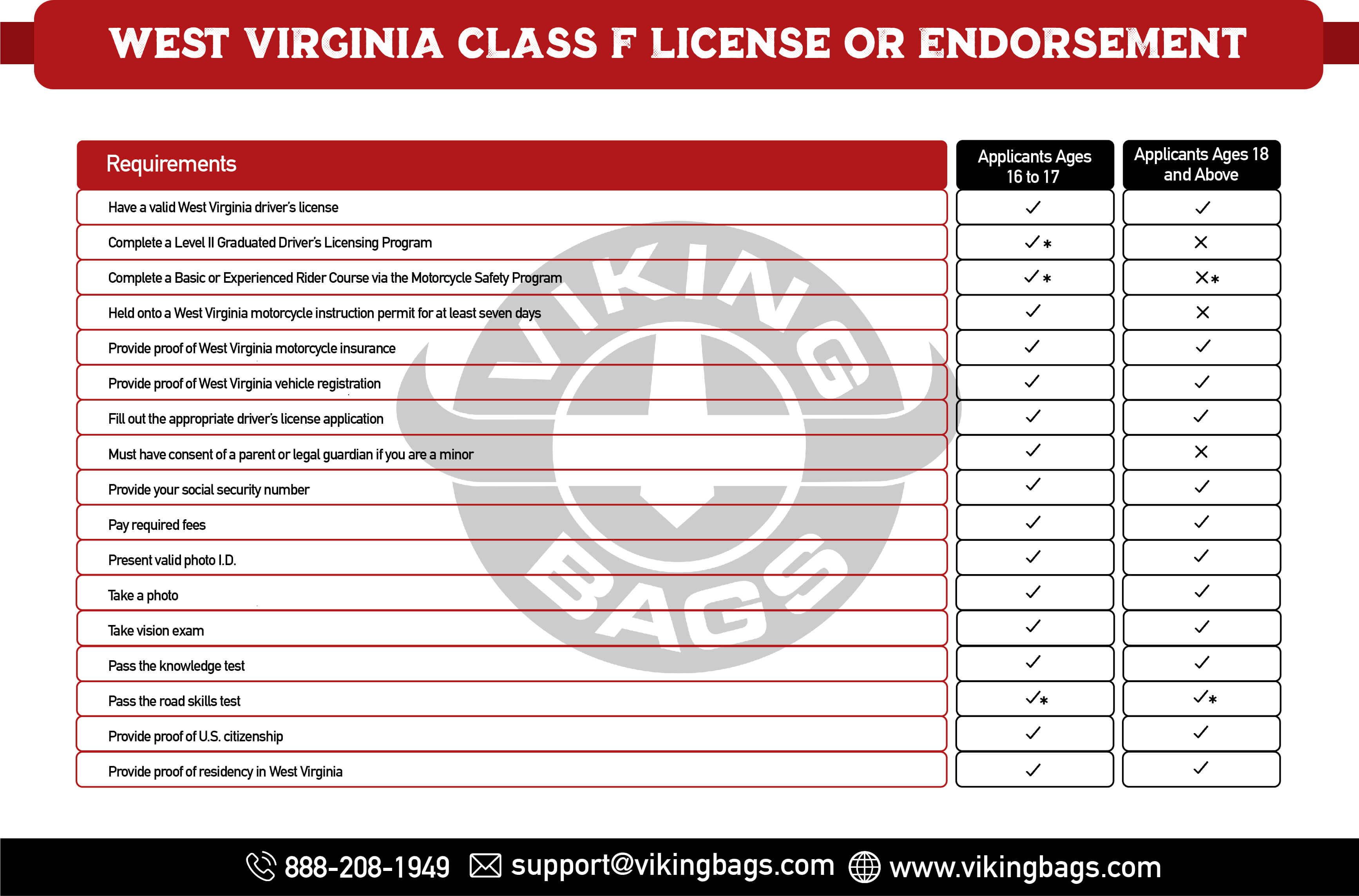
*If you are under the age of 18, you are required to pass a Level II Graduated Driver’s Licensing Program before you can be eligible to receive a West Virginia motorcycle instruction permit
*You will need a West Virginia motorcycle instruction permit to be allowed to register for a rider course. If you successfully complete a Basic or Experienced Rider Course, you have the option of waiving the roads skills portion of the West Virginia motorcycle license test
4.3 West Virginia Motorcycle License Test
Knowledge Portion:
- Will be completed on touch-screen computers
- Complete 25 multiple-choice questions
- Questions will be based on content from West Virginia Motorcycle Operator Manual
- Will be tested on understanding of road rules and safe riding practices
- Requires a passing grade of 80% or higher
Riding Skills Portion:
- Will be conducted in an actual traffic environment or in a controlled, off-street area
- Your motorcycle will be subjected to a pre-ride inspection to ensure it meets safety standards
- Demonstrate basic understanding of motorcycle operation
- You will be tested on your ability to stay within the speed limit, adjusting speed and position, maintaining visibility, operating under stress, accelerating, braking, turning, stopping, and swerving
- The examiner will grade you based on how well you ride at safe speeds, stay within the lanes, and demonstrate riding maneuvers
5. West Virginia Motorcycle Passenger Laws

In West Virginia, there is no minimum age requirement for motorcycle passengers. All motorcycle passengers regardless of age are required to wear an approved motorcycle helmet at all times. Their motorcycle helmet must meet the criteria listed in the earlier section.
For it to be legal to carry a passenger, your motorcycle must be outfitted with equipment specifically designed to provide secure yet comfortable seating for one additional person. The required equipment will include a designated passenger seat, handholds, and footrests.
The designated passenger seat can only be fixed to the sides or at the rear of your motorcycle. There must be space between the driver and passenger seats to allow the passenger to fully extend his/her legs on both sides. This will also prevent the passenger from interfering with the operator while handling the motorcycle. The designated passenger seat can only be positioned at the following places on your motorcycle:
- The back part of a large driver’s seat
- Towards the rear as a separate saddle
- Fixed to the side as a sidecar
Because there is no age restriction, you will have to consider other criteria when deciding who can safely ride with you. A popular rule of thumb is that a passenger must be able to reach and plant their feet against the footrests. Therefore, it is best to avoid transporting young children or elderly individuals. Other characteristics to look for in a motorcycle passenger include the following:
- Your passenger must be able to reach the footrests
- Your passenger must wear an approved motorcycle helmet
- Your passenger cannot be carrying any packages
- Your passenger must be able to understand and follow your directions
6. West Virginia Lane Splitting Laws

Motorcyclists are forbidden from attempting any form of lane splitting while operating a museum in West Virginia. Because lane splitting involves getting precariously close to larger vehicles and maneuvering in their blind spots, the chances of getting into a fatal accident become higher. To avoid collisions and trouble with local law enforcement, motorcyclists should avoid engaging in the following behavior:
- Riding on top of the dividing lines between lanes
- Riding in between adjacent rows of stopped vehicles
- Overtaking a larger vehicle ahead in the same lane
Thanks to the high maneuverability and compact design of motorcycles, riders are entitled to certain rights regarding how they can act when on the road. Motorcyclists are allowed to attempt the following behavior in West Virginia:
- You are allowed to make full use of the space within your current lane
-
You can only share a lane with another motorcycle if:
○Both parties stay apart at least two abreast
○Both parties consent beforehand
7. West Virginia Motorcycle Equipment Requirements

If you wish to continue operating a motorcycle in West Virginia, you have to bring your vehicle in for a yearly vehicle inspection that is observed by the West Virginia State Police. If you have used your motorcycle frequently in the past year or have not yet closely examined the condition of the primary components, it may be good to start getting into the habit of conducting periodic inspections. Due to debris, punctures, or the passage of time, the primary components in a motorcycle can become damaged without you even noticing. A closer examination will help you figure out what parts need to be replaced or fixed. Make sure to apply repairs immediately as a motorcycle’s functionality becomes compromised if even a single system starts to fail.
Listed below are the equipment your motorcycle must be fitted with to be considered street legal in West Virginia. These components are essential to your motorcycle’s maneuverability, visibility, and overall functionality:
- Horn
- Wheels
- Tires
- Handlebars
- Front & Rear Brake
- Controls
- Headlight
- Taillight
- Brake Light
- Turn Signals
- Exhaust system
- Muffler
- Rearview mirrors
8. Source
 www.vikingbags.com
www.vikingbags.com
888-208-1949
391 Thor Pl,
Brea, CA 92821
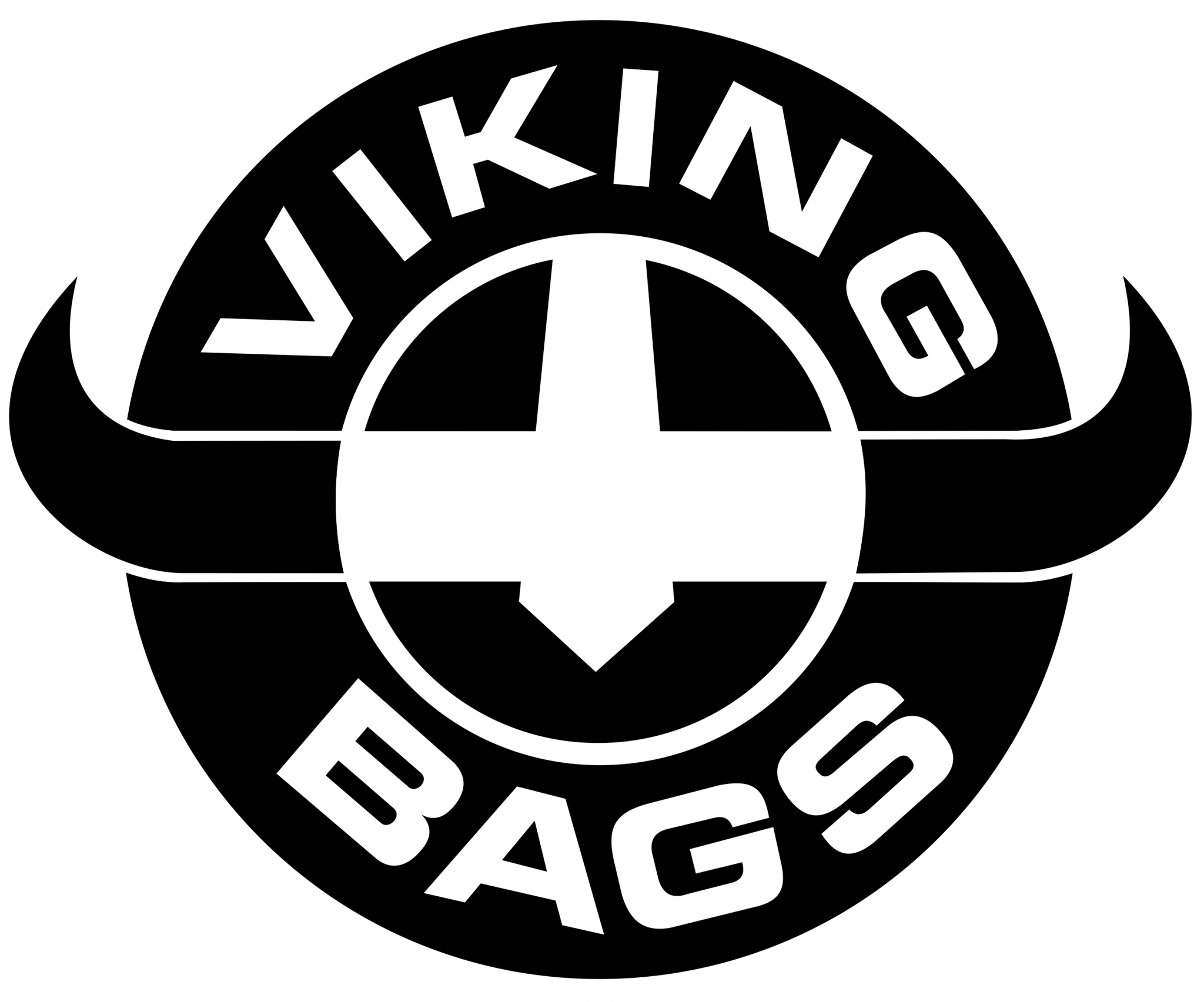








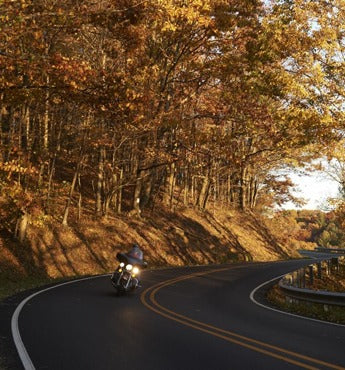




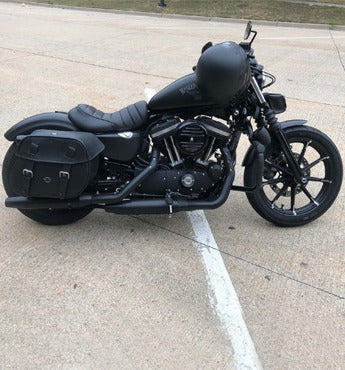
Leave a comment
All comments are moderated before being published.
This site is protected by reCAPTCHA and the Google Privacy Policy and Terms of Service apply.